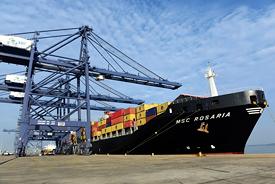Total number of posts 463.
 For each container of woodwork shipped from the Cat Lai port in Ho Chi Minh City, Vietnam, to the United States, exporters have to pay up to US$25,000.
For each container of woodwork shipped from the Cat Lai port in Ho Chi Minh City, Vietnam, to the United States, exporters have to pay up to US$25,000.
Rising logistics costs and a shortage of shipping containers have put further pressure on exporters.
“An upsurge in shipping and storage costs has made life hard for Minh Duong Furniture and other firms active in the wood and woodwork industry,” Duong Thi Minh Tue, director of Minh Duong Furniture Corporation, lamented.
Each month, the firm exports some 200 woodwork containers to the United States, at an exorbitant freightage, while the transport cost of each container of goods to Europe hovers at US$12,000-US$14,000.
Facing the same fate, rising shipping costs have also become a big hindrance to seafood exports. The surge in transport costs has pushed up the prices of products and reduced their competitiveness, discouraging partners from signing new agreements.
Minh Phu Seafood Corp. reported an 11.2% year-on-year decline in profit in 2021 due to increasing maritime transport costs. A representative of the firm said that the shipping fee of a container to the United States was US$19,000-US$20,000, double the previous level.
Shipping costs at all-time highs
The current maritime transport cost was higher than the peak last year. For example, the rental price of a container for goods bound for some Asian countries such as Thailand hovers around US$1,600-US$2,500, while the price is US$4,000-US$5,300 for transport to the Philippines and some US$12,000-US$14,000 for shipping to the East Coast, said a representative of the Vietnam Association of Seafood Exporters and Producers (VASEP).
A survey conducted by the Malaysian National Shippers Council showed that the shipping cost hit an all-time high as it surged by 100%-700% against the pre-COVID levels. The 2021 cost soared by up to 100% against the previous year. The shipping cost has sharply gone up since early 2022.
According to Freightos data, the 40-foot container rental price still stands at the highest-ever level. The spike in costs of shipping goods to Asia and Europe was attributed to a severe shipping container shortage and a reduction in capacity among shipping lines.
Tough to rent containers
Aside from skyrocketing shipping costs, exporters also find it tough to rent shipping containers, according to VASEP. Booking container ships to Baltimore, Miami, New Orleans and Houston ports of the East Coast has become challenging as besides high shipping costs, few shipping lines agree to transport goods, while cargo ship trips are also being cut.
Despite booking containers two months before their production, many firms have failed to get enough shipping containers after getting ready to export their products.
The cost of shipping goods to the Chinese market has increased two- or three-fold against late 2021, but it is still hard to book cargo vessels. The main reason is that seaports in China are tightening anti-COVID measures and scaling down operations, leading to huge backlogs of containers there.
Worried about shipping cancellations
Many exporters are always anxious about ship cancellations or delays. They even have access to shipping containers only closer to the date of transporting goods. Huge backlogs and congestion at ports result in ship delays and a severe lack of containers.
In the past, customers only cared about the prices of goods, but now they must keep a watch on shipping costs, said Tue from the Minh Duong Furniture Corporation, adding that woodwork is a bulky and heavy item, thereby strongly pushing up shipping costs. Besides, importers have refused to receive goods because of constantly rising transport costs, forcing Minh Duong Furniture and other wood and woodwork manufacturers to hire warehouses to store their goods, increasing their costs.
“American buyers are now cautious about importing goods as they cannot control shipping costs, thereby failing to set selling prices. Many customers are waiting for shipping cost stability rather than placing new orders,” Tue said.
Burden behind soaring fuel prices
Another burden exporters face is the jump in fuel prices. High oil and petrol prices have pushed up roadway and maritime transport costs.
Saigon Newport Corporation had earlier announced that it would revise the fees for road and sea transport services at Cat Lai, Hiep Phuoc and Dong Nai ports and inland container depots by 10%-30% due to the spike in fuel prices.
Many experts attributed the shortage of shipping containers and cargo vessel delays to unsolved supply chain disruptions. The situation is expected to continue for a long time. As such, when and how these burdens facing local manufacturers and exporters will be removed is still unknown.
Source: VOV














